Canary
A Literary Journal of the Environmental Crisis
Canary is a literary journal that explores one’s engagement with the natural world. It is based on the premise that the literary arts can provide an understanding that humans are part of an integrated system. Our theme is the environmental crisis and the losses of species and habitat as a result of this ongoing disaster. Our mission is to deepen awareness of the environment and enrich the well-being of the individual and in turn society as a whole.
Issue Number 68, Spring 2025
Planet Earth will enter a new era of its history,
cheerfully called by some the Anthropocene, a time
for and all about our one species alone. I prefer to
call it the Eremocene, the Age of Loneliness.
- E. O. Wilson
Contents
- Foraging by Gabriel Dunsmith
- The Tree at Sycamore Gap by Connie Soper
- A Magus in the Sand by Louhi Pohjola
- When Better Angels Dive by Sheranne Schwartz
- The Last Butterfly by Naomi Pliskow
- At Varanasi by Anna Citrino
- The Old Man Who Hid Music by Tom Sheehan
- Saving Home by Carla Rojas Paz
- Great Blue Heron by D.R. James
- The Garden by Jeff Tobin
- Banking on Seeds by Charlotte Melin
- Gardening Dysphoria by Charlotte Melin
- This and What Comes After by Michelle Hendrixson-Miller
- The Number of Men Controlling Half the World’s Wealth Has Dropped from 62 to 8. by Michelle Hendrixson-Miller
- Pentimento by Elizabeth Libbey
- Frog Hollow by Rohan Buettel
- Possums by Rohan Buettel
- Bush Capital by Rohan Buettel
- Encounters by Rohan Buettel
- Turkey Vultures at Malheur Visitor Center by Karen Jones
- One Hundred Percent Natural by Paul Smith
- Testimony by John Tessitore
- Family Man at Laguna Lake by Elica Sue
- Dead Zones by S.D. Dillon
- Bear Encounter by John Popielaski

Foraging
by Gabriel Dunsmith
Gabriel lives on a peninsula surrounded by the bay Faxaflói ("Horse Mane Bay") and in the shadow of the mountain Esja, in Iceland.
Hearing the golden-winged warbler and knowing it may seldom sing again,
I lift a rotting log to reveal a colony of pinhead mushrooms
whose distant cousins deep in the trees folks in East Tennessee
used to call wood fish, which they scrounged up when there was scarce any
corn in the corncrib or sausage in the larder, with hog-killing
time still months away. Those frilled and fecund fungi are one of many
things I’ve yet to taste, though my grandfather once led us looking
through the wet-leaf, damp-bark springtime until we hit the driveway,
circled home. It’s true that some treasures will never be found
in time to pull us from the brink, while others name to us our losses,
just as, like countless creatures of the earth, we’re bound
to search for what we love until it’s gone.

This poem previously appeared in Still: The Journal.
© Gabriel Dunsmith

The Tree at Sycamore Gap
by Connie Soper
Connie is fortunate to live in a city with many public parks and natural areas, not far from the confluence of the Willamette and Columbia Rivers. She takes full advantage of the rich and diverse environment by walking and taking photographs in these special places.

This iconic and beloved tree, estimated at nearly 300 years old, once stood in a dip next to Hadrian's Wall in Northern England. It was chopped down by vandals on September 23, 2023.
Gone in twenty minutes—gone forever
when just last week, last year, last century
this one tree silhouetted its psyche over
all of Northumberland. We have come
to lament the mutilation with bouquets,
ribbons with nowhere to tie them.
Stem to branch, branch to trunk—
no fallen tree can be resurrected.
The severed stump smells
of sawdust, the remains of its own demise.
We circle it, standing next to scars
in the landscape, a new emptiness
at this place named for a sycamore
that shook its deciduous
skirt between the hillocks
next to an emperor’s ancient wall.
We mourn for the nests and the hives,
for what cannot be undone;
that we could not protect
what would save us.
© Connie Soper

A Magus in the Sand
-after Gerald Stern
by Louhi Pohjola
Louhi lives in the Johnson Creek Watershed near the Willamette River, the former home of the Clackamas Indians, Chinookan speakers who lived in the Columbia River Valley. Mt. Hood is visible on clear days, but her presence is felt even on the rainiest of days.

What I took to be the bleached scapula of a whale
turned out to be the door of a plane nesting
in between the cleavage of sand dunes.
What I took to be an orb of quartz
turned out to be a doll’s severed head
imprisoned in gray, unearthly light.
What I took to be driftwood
turned out to be soap dispenser bottles,
milk cartons, and buoys, pallid and bloated.
What I took to be a gannet’s orchid-shaped bone
turned out to be plastic pansies peeping beneath a shell.
What I took to be an Eden was an abandoned home.
What I took were the scapula, quartz, driftwood,
and gannet’s bone, that death or weather had transformed.
© Louhi Pohjola
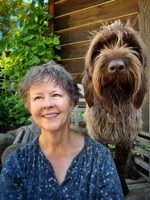
When Better Angels Dive
–– after Koshiro Onchi's Diving
color woodcut on paper (1932)
by Sheranne Schwartz
Sher lives on a historic 200-acre farm near the eastern section of the Columbia River Gorge Scenic area in Oregon. The landscape she inhabits holds prairie, white oak savannah, and riparian lands. She and her husband have spent the past 13 years planting for pollinators and restoring native grasslands.

Koshiro's woman flings her soul down
chasing a Hope––I would not dare
I prefer to swim up to life's surface
pop up into this world's growing gloom
And look about the cloudy canopy
century's lament––Were we unaware?
My plastic feathered bathing cap
blast-beruffled plumes
I bob an ocean consciousness
her's a shot-down word
I, frail bird, start to sing
caroling to reach around the world
The title––we are sorry, melody––regret
we harmed you Living Things...
Homo Sapiens––I'm afraid
A consequence of opening––desire's door
© Sheranne Schwartz

The Last Butterfly
by Naomi Pliskow
Naomi lives on the shores of Springton Lake, a man-made reservoir created by damming Crum Creek, a tributary of the Delaware River. The lake was created to help provide drinking water for some of the 200,000 humans who make Delaware County their home. Its shores are a nature preserve that filters run off and provides a home for foxes, deer, and nesting geese.

Here I come, with cleated boots
shredding green and sleeping nests
crushing multi-legged hordes
making rivers weep,
to spill untethered
over helpless banks.
With fetid exhalations
I ignite the choking air.
And still I come, roaring
waving swollen arms with anvil fists
brush soft breasts of outraged hills
rake the trembling earth with metal claws
shedding scales of iron and of glass
scream with eight billion separate voices
that yawp and gasp and chitter
clang and scrape until no one can hear
the hushed slow swoon of Gaia
subsiding in celestial space
or the whisper of the last butterfly.
© Naomi Pliskow

At Varanasi
by Anna Citrino
Anna grew up in the San Diego River watershed. She taught abroad for 26 years in six different countries. She currently lives near the edge of the Atascadero Creek in Sonoma County.

Morning sun gleams gold off the ghat’s stony tiers
and flat walls rising alongside the ancient riverbank
as our boat floats down the Ganges’ smooth face.
Above the ghats rest wooden pyres stacked
seven feet high, red coals burning beneath them
as if great, glimmering eyes staring across the river.
In a ritual of release and renewal, hundreds descend
the stony steps to slip into the sacred water, drink in
its element, immerse themselves in the Ganges’
cosmic blessing, seeking the river’s potential to purify.
For three thousand years bodies have been cremated here.
have For three thousand years people have irrigated, drunk,
and bathed in this water.
A city between this world and the next, Varanasi
is not a tidy place with bright neon, slick tile,
polished floors, or clean windows.
Here, nearly everything seems on the arthritic edge
of collapse. People come to Varanasi to die.
Appearances do not matter.
Dust incases walls. Stones topple into the street.
Soot clings to doors and derelict windowsills,
and 3000 million liters of untreated sewage
are pumped into the river every day.
Industrial effluents, chemicals from tanneries,
trash, floating bottles, and corpses—all
are found in the Ganges. Yet millions
fish and grow food from these waters
every day.
Gliding through the water in silence
we breathe in air dusted with death’s smokey
residue.
Eventually, everything dies.
But no one wants the Ganges to collapse
into silence. Her death could never
be beautiful. Half the world
would fall still.
After eons of carrying sewage and corpses,
the centuries she’s lugged trash, and born up
under her coat of ash, the Ganges thirsts for renewal,
longs for moksha—for the ablutions
that will set her free.
On flows the river. Its sun-flamed body
streams out of sight, carrying its burden
with it. Perhaps even rivers send up messages
in flames of light, make wishes
for their impending deaths to be recognized.
Consumed by the sun’s liquid fire
reflected across the water, we disembark,
rise into the day’s heat,
the whole world charged
with burning light.
© Anna Citrino
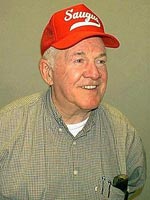
The Old Man Who Hid Music
by Tom Sheehan
Tom lives in a house built in 1742 about 200 feet from the Saugus River in the Saugus River Watershed bounding 900 acres of the Rumney Salt Marsh and 450 acres of a wetland, Reedy Meadows.

One day, at the little house where the dowser used to live, a kind-looking man with a beard came carrying all he owned on an A-frame on his back. He set the A-frame on the ground and looked at the small house needing much work. Muscles moved under his shirt.
“Whose house is this?” he said to some children playing at an edge of a field. This was the place where the mountain came to a rest, but the river had not been found as yet.
One of the boys said, “It used to belong to the dowser, but he went away.” The boy used a stick to walk with as one leg was slightly crooked and made him lean.
“Why did he go away?” the man said, looking closely at the stick the boy had to use.
“People laughed at him,” answered the boy. When he looked at his friends some of them began to chuckle and grin. “Don’t,” the boy said. His sandy hair caught the wind; his eyes were hazel and steady.
“If I want to fix this house up and live here, tell me who I have to see.” The children could see some of the tools hanging on the man’s A-frame. On edges where the sun touched them the tools shone brightly as if they had been polished with gems.
“See Macklow the mayor. He lives down there where those walls meet.” The boy pointed across the wide fields. “He’ll be on his porch listening to the birds of the fields. My name is Max. What is your name?”
The man of the tools smiled at Max’s description of the mayor. “My name does not count, only what I do,” he said. He walked across the fields and soon had the house to work on. At first it was just the children who watched him fix doors and steps and windows, but soon other people, including Macklow, came to watch. All the time he used tools the man whistled different tunes. At his work he was a happy man.
The house was soon a sparkling and cozy place with no lopsided boards and no broken steps and no windows free to the air. When the man needed wood, he put the empty A-frame across his shoulders and walked off toward the mountain and the forests. In the evening he returned with a pile of wood of all lengths sitting across the back of his shoulders.
“Someday, perhaps soon,” he said one day to the children watching him, and a few of the older people, “I will have a surprise for you.” As usual, just at dusk, the man took some of his wood he had been working with and brought it inside the little house. The light went on inside, so they knew he was still working.
Nobody knew what he was working on. But the light burned long into many nights.
And soon, to everyone’s surprise, a garden was also blooming behind the house. Macklow was really surprised because his own fields were slow. Nobody had seen the kindly man walk out of his little house at night, time after time, and put buckets of water on his little garden. The dowser’s well was right inside the little house and those who had laughed at the dowser never knew about the well and the sweet water it gave up.
One morning the man came out of his house and gave a new stick to Max. It was much better than Max’s old stick and was smooth and polished and very strong. Max was proud of his new stick and could walk faster with it. Over his head he waved it and showed it off to his friends.
On each morning from then on, the man began to build a fence around the house and the garden. At first he put up strong posts, then mounted stringers between the posts. When all the posts and stringers were mounted and connected, he began to place upright pickets on the stringers.
Now and then one of the pickets would cause someone to laugh and titter about its strange shape. Some of the pickets were not as pretty and straight as others. Some indeed looked odd and out of place. But the man kept adding both straight and odd-looking pickets to the fence.
“See,” Macklow said one day when village people were talking about the fence, “he brings out what he brought into the house the night before. What he does to it is a mystery, but let us not laugh at him. We laughed at the dowser and he went away in the night. This man is a kind man and has promised us a surprise. Do not laugh at him, no matter what his fence looks like.” When he looked at little Max with the new stick, Max and Macklow swapped nods, as if they shared a secret.
But laughter, though, did come each day, at the way the fence looked, at crooked or bent pickets, at the weird shapes of some of them.
Then the day came when all the vegetables in the garden were ripe, and the bizarre fence circled the house. The man seemed pleased and put his tools down except for one knife and walked off toward the forest. He came back with one small piece of wood. From that piece of wood, he whittled a small whistle. When he blew into the whistle he found only one note, a pure note, but only one note.
There was more small laughter and chuckling, but Macklow, remembering the dowser, thinking about the new ripe garden and his own slow crops, would not laugh. Nor would Max with his new walking stick
One morning the man spoke to some people looking at his crop and studying what he had done to fix the house and the fence he had placed all around it. “I have hidden the music here. Music is a part of the soul. Music is part of the water too. And water is part of the soul. Whoever finds the music I have hidden can have this house, for Macklow says it is mine to give.”
Macklow nodded his head.
In the morning the man was gone. The tools were gone. The A-frame was gone.
People pored over the house trying to find the music. They did not know what they were looking for. But they found the dowser’s well at the back end of the house and wondered at that. Macklow marveled at the well. However, he made sure none of them disturbed the things the man had done to fix the house.
It was curious. Nobody could find the music. None of them knew what they were looking for. But Max kept playing the whistle and kept hearing the note. He would sit on the porch and blow the whistle until people began to be bothered by it and asked him to stop.
But Max also knew that note deep inside his head.
For weeks people looked for the music. But they did not know what they were looking for.
And then, one morning as he walked past the house, Max hit one of the pickets with his stick.
Oh, how his heart pounded in his chest. How it grew it seemed that it might explode.
It was the same note from the whistle. The exact same, beautiful note.
Back to the gate he went, at the same note-sounding picket and began to walk around the house, his stick slapping against each picket in turn, the way boys have done ever since going by church and school yard fences.
And Macklow looked and the people looked, and they all heard the music coming from the fence pickets as Max, walking without his stick support for the first time in his life, played elegant music on the ugly looking pickets with the stick the man had carved. The circled fence played out a whole lovely tune.
And Macklow saw to it that Max and his mother had themselves a new house to live in, at the place where the mountain comes to rest and the river is not yet found.
© Tom Sheehan

Saving Home
by Carla Rojas Paz
Carla lives east of the Gulf of Mexico near a large and beautiful natural harbor and shallow estuary and on the traditional lands of the Seminoles.

FIRE: Canada
1.
Amy looks out over the tree line in the boreal forest, where a raging inferno of orange roars above the pointed jack pine trees. Plumes of black smoke grow above it like tumors, fading into haze while hazardous particles blow into the United States and travel across the Atlantic. She pours water on her face. It drips down onto her heavy firefighter uniform, leaving streaks of soot, sweat, and dirt.
Amy knows fire. It’s her culture. It’s healing. For centuries, her people of the Métis
Nation, like many other indigenous groups worldwide, practiced “cultural burns” or
controlled low-intensity fires rooted in intergenerational knowledge to regenerate the
forest’s soil nutrients and reduce tinder-dry bush that fuels wildfires like the one she’s
fighting, but the government banned them up until last year. First, they displaced her
people from the land—their home; then came the ban.
Before jumping into her truck, she takes a few minutes to mourn her family’s pictures and heirlooms that she couldn’t save as she evacuated her house. They vanished in ash. Amy prays over her ancestral land and the wind carries the prayer far east, where it settles on a house of sand in Somalia.
2.
AIR: Somalia
“Allah is angry at us,” says Muna, as she scoops buckets of white sand out of her
living room on Somalia’s coastline. “Keep shoveling,” she instructs her four children.
And they shovel, just like they have for almost a year now. The youngest, a one-year-old,
playing with a wooden spoon, grabs a fistful of sand and puts it in his mouth.
Muna thinks of Sharif, her late husband, and the first house he built for her that the sand
swallowed. Over the last three years, fierce winds have whistled and howled, gradually leveling trees, clogging water wells, burying houses, and entombing the town’s only school.
Muna and Sharif once owned hundreds of sheep and goats, which they used to herd in search of pasture and water. But the rains have not come again, and Muna owns only five sheep now. It’s not enough to provide for her family.
She stands in ankle-deep sand, observing the house’s rusty corrugated metal roof. It
rattles and creaks. Mogadishu, that’s where she’ll go next, like the rest of the families in
her town who left long ago, their houses succumbing to insidious sandstorms and
desertification.
Muna tosses the last bucket of sand. She looks out onto the ocean, and dreams of the soft waves caressing her lightly like Sharif once did. The tide has come. It pulls her memories along the waves and out to sea, until they reach the Pacific shores of Tuvalu.
3.
WATER: Tuvalu
Tala dives into the sparkling, shallow blue waters surrounding her home in Tuvalu.
She imagines she’s a bright blue surgeonfish, oval-shaped and smattered in dark blue body accents and a yellow tail, swimming, grazing on algae attached to coral. But in real life, as she swims closer, she sees only a ghastly white and gray graveyard of coral that looks like moldy and calcified sponges, brittle enough to break with a tap of a finger. She sees no fish. They’ve left their once-fertile feeding grounds, now a hot and acidic soup of an ocean.
Tala emerges from the water on the beachfront, where her brother is piling old rubber
car tires under the coconut trees in the front yard. It’s a makeshift seawall to temporarily stop the rising sea waters from reaching her house.
“The foreign minister just called for Tuvalu to become the first digital nation in the
Metaverse,” her brother says.
“What?” says Tala.
“We’re sinking under water, and everyone is leaving for Australia or New Zealand,” he
says. “He thinks Tuvalu can keep existing, either in virtual or augmented reality, so that
our culture can stay alive for future generations.”
A digital nation? A digital home? Tula contemplates this idea on and off for the next
couple of hours. Before she knows it, she’s lost track of time and the sun is setting. She
sits down on the beach and follows the sun’s gradual descent, letting it and her thoughts
submerge beneath the horizon. She’ll be asleep and dreaming of the ocean when the sun reappears, its reflection dancing off the glaciers in the Andes Mountains in Chile.
4.
EARTH: Chile
Kayla crouches awkwardly, facedown with her nose almost touching the ice of the
Southern Patagonian Ice Field in Chile. Her pupils dilate with wonder. She’s looking at
the rare “ice dragon,” a type of stonefly over half an inch long, that’s made a home out of
one of the most inhospitable, frigid, and barren mountains on earth. It skitters away.
As a little girl growing up on the Gulf of Mexico shores in Florida, Kayla thought she’d
become a marine biologist like her father, but the serene beauty of the ice-capped Andes
Mountains mesmerized her like magic. Twenty years ago she left Florida and made
Chile her new home.
“All good on the ice? Over,” says Kayla’s glaciologist friend on the satellite radio.
“No rumbles. Over and out,” says Kayla, referring to the sound of an avalanche. Six months ago, a jagged chunk of melting glacier crashed near tourists in the Queulat National Park. Patagonian icefields are among the fastest melting glaciers in the world.
Today is Kayla’s last day on the mountain before she takes a career break to care for her
ailing father in Florida. She crouches down toward the earth again and wonders how
much time her father has and what will happen to the ice dragon if its home keeps
melting.
Suddenly, she feels a cracking coming from her chest. Then a deep bass sound roars out
like a torrential waterfall. Startled, Kayla reaches for help on the satellite radio. But it’s
not an avalanche. The sound, alive and breathing, is grief for her father and for the
majestic and sublime place some call “The end of the world.” For Kayla, it’s home.
© Carla Rojas Paz
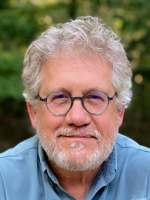
Great Blue Heron
Look, I want to love this world
as though it’s the last chance I’m ever going to get
to be alive
and know it.
—Mary Oliver, “October”
by D.R. James
D. R. (David) lives on an oak-forested peninsula surrounded by the Kalamazoo River meandering through its watershed, which, five miles west, empties into Lake Michigan.

Busy inhabiting my world—
blazing car, radio blather,
coffee buzz that wouldn’t last—
I somehow caught a left-hand glimpse,
so quick I didn’t see you flinch,
yet so outstanding, you could’ve been
a plastic cousin to the prank flamingos
that another morning
enthralled my neighbor’s lawn.
Stark still, ankle-deep
in that transitory water,
only the one side, one-eyed,
wide as disbelief, you looked
just like you looked, posed
in the Natural History Museum,
1963: for again,
all those slender angles,
the spear of your bill,
that deathless intensity
marking your stick-form way, only
now in a mid-May puddle poised
between the intersecting rushes
eastbound, 196, southbound, 31.
And you, still doing
what you’ve never known
you do, still finding your life
wherever you find yourself—
while I, still fixated as always
on finding myself,
as if that were to find a life,
saw again how wildly
I am alive—
how I always want to know it.
First published in Ruminate 2
© D.R. James

The Garden
by Jeff Tobin
Jeff lives between the Everglades’ river of grass and the ceaseless Atlantic ocean, watching ospreys, manatees and flamingoes in this wild biological canvas.

We cultivate the earth,
planting seeds with hands both nurturing and negligent,
in soil rich with history and strewn with plastic.
We walk the green edges of our own making,
caretakers on paper, yet vandals at heart,
loving the view, yet blocking the sun.
Our footprints, deep and lasting,
mark the paths we claim as progress,
heavy with the weight of good intentions,
light with the touch of forgetfulness.
We water gardens with rivers rerouted,
quenching thirsts while deserts expand,
blossoms bloom as ice caps melt—
growth and loss in a single breath.
In the night, we light up the sky,
outshining stars with our electric glow,
beacons of advancement, shadows of the Milky Way,
both illuminating and obscuring.
We harvest the wind, harness the sun,
hold power in the palms of our hands,
yet tremble before the storms we’ve stirred,
engineers of both salvation and catastrophe.
In each act of preservation, a hint of destruction,
in every innovation, a tinge of depletion—
paradoxes planted in the garden we tend,
where every truth contains its contradiction.
© Jeff Tobin
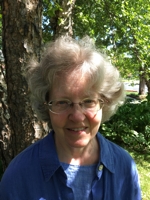
Banking on Seeds
by Charlotte Melin
Charlotte lives on the Cannon River, which flows into the Mississippi south of the confluence with the Minnesota at Bdote Minisota, a Dakota sacred site.

Banking on seeds to produce
summer bounty, I finger
a runner beans packet,
guess how many tiny
forget-me-nots an envelope
contains, imagine the orange
pictured nasturtium’s
scent from disturbed leaves.
Gardening investments,
with unpredictable returns.
© Charlotte Melin
Gardening Dysphoria
by Charlotte Melin

Deep knowledge of timing—
when to plant seeds,
the pace of germination,
the projected growth volume
at each point in the season
has become irrelevant.
Flash drought, bad air,
out of sync ecocycles
have disrupted gardening.
Carrying a single
watering can to each
prized plant will not save
the whole.
© Charlotte Melin
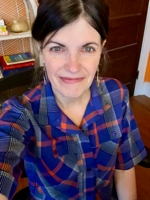
This and What Comes After
by Michelle Hendrixson-Miller
Most weekends in summer, Michelle can be found with friends, kayaking the Duck River, one of the most biodiverse rivers in North America. This waterway contains several species of freshwater life, like the pearly birdwing mussel, found nowhere else on Earth.

The air opens into cooler air, and we say nothing. Not hello. Not I miss you. We move what we own around to maximize space. When flood waters rise elsewhere, we somewhere scoff or shrug. More and more, what we don’t do builds an arsenal against us. Not doomed yet—but here, the upturned wheelbarrow and drowned cows. When our future selves look back, they hold us in contempt—picking what we want to moan about. The spoiled melons. The hills burnt black. Yet, there was a time when colors floated through our minds without words—a time when a cloud in the shape of a turtle plowed our thoughts into fields. Look, we had to learn for ourselves how to count the miracles. How, as children, we once sat in the back of a Ford Pinto—not burning. How, one day, we lost nothing more than the cap to the olive oil and, for a little while, our keys.
Previously published in Pithead Chapel
© Michelle Hendrixson-Miller
The Number of Men Controlling Half the World’s Wealth Has Dropped from 62 to 8.
by Michelle Hendrixson-Miller

Not only are 8
men sucking
up half the world’s wealth,
like 8 rogue clouds sucking
up an entire ocean,
they are also sucking
up the sun, sunflowers,
dandelions—sucking
the breath I mean,
the hope.
© Michelle Hendrixson-Miller
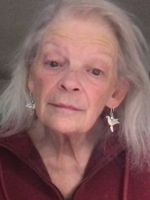
Pentimento
by Elizabeth Libbey
Elizabeth lives in western Massachusetts on 40 acres of wildlife refuge.

At the gas pump, waiting to be filled,
I glanced up through the windshield—
early Earth was bleeding
through the propane tank, plankton
beaded on the tank's curved steel.
The stand of young white pines behind
blushed ancient red near their crowns.
In the rainbow puddles where the asphalt
had sunk in, huge horned frogs,
throats ballooning, croaked.
Donna, the attendant
I'd known casually for years,
unscrewed the gas cap. Plankton
oozed out around the nozzle
as she jammed it in. She wiped her hands.
I handed her my plastic.
“You must have been running on fumes,”
Donna said.
I pulled out onto Route 2,
pressed the pedal for home to funnel plankton
into my generator ahead of coming night's
unpredictable predicted storms.
I was so anxious I barely noticed
the Deerfield, dammed casual river,
was out of its banks, spreading like a sea
from which I must have crawled.
By the time that had sunk in,
I was already gone by.
© Elizabeth Libbey

Frog Hollow
by Rohan Buettel
Rohan lives in Australia’s bush capital, nestled in the foothills of the Brindabella range beside the Murrumbidgee (Australia’s second-longest river) on land whose traditional custodians are the Ngunnawal people.

In Karawatha Forest, amidst the dry
and quiet heaths, melaleucas stand
in low-lying wetlands.
A scarlet-sided pobblebonk hides
in mud. The wallum froglet,
size of a two-dollar coin, inhabits
a pocket where nutrient levels are low,
laying eggs in acid water.
The bleating tree frog makes
a high-pitched screech from
its swelling vocal sac: hides
under bark and stones; a flattened form
to squeeze through gaps; coming out
at night to hunt mosquitoes, flies and gnats.
The eastern sedge frog, green stripes
lining head, body and leg, breeds
all year long. Striped burrowing frogs
go underground, waiting in a torpor
for the rain, reducing body temperature
and metabolic rate, and there they stay in place.
Then comes the heavy rains and Frog Hollow
explodes in a cacophony, male frogs croaking,
barking, trilling and chirping. The pobblebonk
engages in a breeding frenzy,
the female laying a floating, foamy mass.
The green-thighed frog, thick dark stripe
across its snout and bright green blotches
on its armpits lays six hundred eggs
in clumps among the reeds.
The copper-backed brood frog calls
for a mate from an excavated chamber
or disused hole, where the female lays eggs
in which the tadpole develops almost to frog
while still encased.
Meanwhile, the tusked frog fends off
male rivals using the tusks on his lower jaw.
The striped burrowing frog, quacking like a duck,
comes to the surface for all the excitement
of breeding and feeding.
In Frog Hollow, twenty-five species
live away from detergents and insecticides,
safe from the pollution that infiltrates
a permeable skin.
© Rohan Buettel
Possums
by Rohan Buettel

They’re not very scared of humans,
making homes in ceilings and chimneys.
Cabling up suburbs for pay-TV
created possum highways, thick lines
Goldilocks right for their paw size.
You see them silhouetted against the sky,
ambling along at dusk. Standing beside
a Japanese maple in the backyard I saw
one come down a pole and the back fence,
scamper across the grass and then up the tree
beside me. I spoke and he turned his head,
sized me up and raced up and onto the roof.
In my twenties, I came home one night
after a party to Bedford Street, possibly
in a tipsy state and saw one on the lawn.
I said to my mate ‘I’ll make like a tree’
and extended my arms like branches.
The possum seemed to understand my intent,
bounded across the lawn, up my trunk
and perched upon my head. Suddenly
I remembered the possibilities of disease
and parasites, reached for him and he raced
back down, across and up the nearest tree.
There is a magic in the suburbs,
wildlife losing its native habitat adapts,
finding new homes amidst the people.
© Rohan Buettel
Bush Capital
by Rohan Buettel
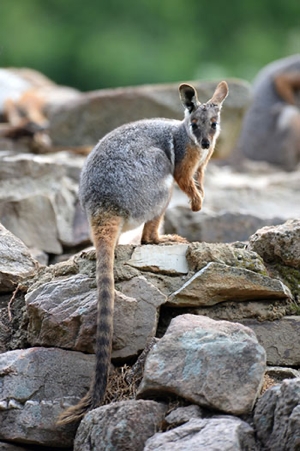
When King O’Malley launched
an international competition to design
a national capital for a young polity,
no one, not least Walter Griffin himself,
thought a radical plan for a city
unlike any in the world would win.
His wife, Marion, an equal partner,
drew the perspectives that gave their entry life.
Its grand axes and vistas in harmony
with the natural landscape, circular roads
and loops geometric or contour controlled,
detached housing and irregular yards; embodying
city beautiful and garden city principles.
A century later we live in a place
populated with museums and galleries,
Parliament and other public institutions;
with no development on hills or ridge lines.
Wildlife corridors stretch into the heart
of the city, suburbs back onto bushland reserves.
People walking in the morning or evening
see kangaroos and wallabies,
their backyards are infiltrated by echidnas,
blue tongues and shinglebacks,
and visited by a panoply of songbirds.
A balance of nature and culture
provides an idyllic life in the city planned.
© Rohan Buettel
Encounters
by Rohan Buettel

It gives you a scare, the big roo unseen,
breaking cover only metres in front
of your mountain bike, charging directly
across your path. Your heart leaps
at every encounter with a large animal
in the wild, despite the dangers,
with the potential for a legion
of misjudgments on your part, or theirs.
At times they follow each other,
lope in line across the hillside
like taxiing planes, predictable
in their trajectory. At others,
untethered, they bound sideways
while on a seemingly straight path,
can easily knock you off your bike.
Don’t get between a mother and her joey,
a basketball of energy bouncing
in all directions and lacking the calm,
that stillness that leaves them unseen
as you pass close by, all focus on track.
It’s a shock to hear the rumbling thunder
of a large unruly mob bounding down
the hillside, it stops you in your tracks,
the only safe thing to adopt their persona,
stay still like they usually do.
© Rohan Buettel
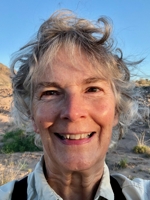
Turkey Vultures at Malheur Visitor Center
Cathartes aura
by Karen Jones
Karen lives near coastal mountain foothills in the heart of Oregon’s Willamette Valley, the traditional homeland of the Mary’s River Band of the Kalapuya.

Silhouetted against the lightening sky,
they perch among rungs of a lookout tower,
group roost under a sliver of old moon.
Domes of their small heads tuck between
rounded shoulders. They hunch like monks
in ruffs of feathers, hiss and grunt the news,
vie for a bit of trash-talk.
There isn’t much they don’t digest
from yesterday’s carrion. Wings opening,
horaltic towards the sunrise, shaven faces
scrubbed to blood-red shine, they mull over
who’s sick, who’s dying, locations and flavors
of recent roadkill and canyon corpses,
their expressions thoughtful, somehow resigned.
Warm now, they lift from their perches,
flap heavy bodies into the sky. Long fingers
of primaries spread to currents of wind,
brown wings gild in the sun
as these bald heroes teeter and sway
in winged V’s, catch rising drafts of air,
circle to begin their daily desert scan,
seeking fresh death, odors of decay.
© Karen Jones
One Hundred Percent Natural
by Paul Smith
Paul lives in the watershed of the North Branch of the Chicago River. Driving over it on Dempster Avenue, the North Branch does not look like the backbone of a large drainage area. The area looks like urban sprawl with a Forest Preserve in the middle. But the North Branch has survived millions of years and has learned to tolerate us. It most likely will survive us.

Thousands of them have found their way
to wind up here
where the air is clear
the waves are mute
they bob and float
in this remoteness
together again
after a swallow or two
from us
the populace
has emptied them
and they were tossed
in the brook
the estuary
the bay
and here now stay
sharing mirth amongst themselves
their contents gone
their glacial mountain purity
but now they’re trash
they brought in cash
laughing at the irony
they populate the open sea
© Paul Smith

Testimony
by John Tessitore
John lives in the SuAsCo Watershed, feeding the Sudbury, Assabet, and Concord Rivers. There are a few hopeful signs that this cradle of American literature, and of revolution, is finding its voice again, in the howls of returning coyotes and the nocturnal scream of the fisher cat.
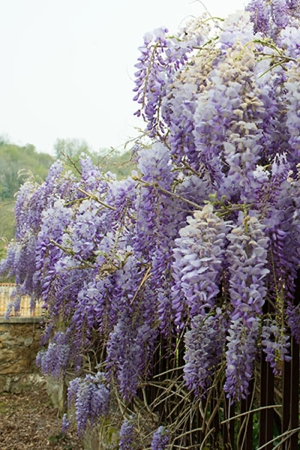
He took his rest on a rock beside the brook.
By the time he sat, his clothes were as muddied
as the far bank, having caned his way across
wet grass like a surveyor, or a day-worker,
temporary labor on his grandfather’s land.
His face was worn stone in the sun and he stared
with the clear eyes of a man who’d seen his share
of struggle—but never a war, a blindness
he wore like a badge of honor. Every spring
he found his reward in the blooming wisteria
that framed his side-door, as it had for as long
as he lived there, growing wild in violent
waves of color. He told me it was “renewal
from every angle”—from this bare ledge beside
this slow stream, for example, across the meadow
he mowed once a month, weaving his tractor
around the tufts of native flowers, the patches
of wild raspberry thick with thorns, groundhog
holes as big as his head. “Once you beat the land
into submission,” he said, “once you drag it all
into the open, what’s left for you except to listen
to the boring rhythm of your own breathing?
That’s why mastery is always self-defeating.
Questions have answers, but awe is fleeting.”
© John Tessitore

Family Man at Laguna Lake
by Elica Sue
Elica lives on the traditional lands of the Tongva peoples, and where the orange groves once grew—near the Santa Ana River and the Pacific Ocean.

Photo by Elica Sue
There is a pair of Egyptian geese that live at the man-made lake. We spot them with their small downy goslings for the spring, eight of them, bobbing and floating alongside their parents like a fleet of toy boats in a bathtub riding manufactured waves. As they pick at the ground for food, we see a yellow plastic band on mother goose’s left foot and a clear fishing wire wrapped around father goose’s left foot, and it can be deadly—digging deep so it bulges above and below, turning his bright pink leg a swollen purple. Fishing line recycling bin; please recycle your used fishing line here—no trash please, no basura. The father goose picks at the loose end of the wire with his beak. He walks with a limp. Stupid fishermen don't know how to clean up after themselves.
We see it all the time; neon bobbers hanging from a clear line in the bulrush, clear line dangling from the trees, tangled line on the dirt path. Have you seen one today? A pair of women in a car on the other side of the fence hear that frustration. And they tell us that they called animal control, but they said they couldn’t catch him earlier, and there was nothing they could do, absolutely nothing, unless we caught him and called them back. The women exit their car with a bucket of oats, scissors, a knife, and a blanket. To catch the father goose, we try to lure him by throwing oats on the floor. These ducks may look like they want a handout but feeding them does more harm than good.
We recruit a father and a mother with a young son who loves the goslings—a family—and they try to help us. The geese jump into the water. We recruit another couple in their early twenties, and the boyfriend offers to use his remote-controlled blue boat to try and steer the geese back onto land. The first attempt at a wild goose chase ends with wings and arms and water everywhere and mother goose splaying out her wings parallel to the floor, honking, honking, honking. Keep an eye out for wildlife in the park’s trees and shrubs. Keep an ear open too. Father goose gets away. Before the second attempt, a young, black-crowned night heron flies into a nearby tree, its red-ring eye turned towards us. Before the second attempt, the father of the young son slips on a rock by the lake, crushing the Airpods that were in his pocket. Do not swim, wade, or bathe in the lake or creek.
Since the father of the young son is already wet from slipping, he gets into the water and pursues the family of geese as the boyfriend with the remote-controlled boat tries to guide the goose family with a long branch he snapped off a tree. They capture father goose in a tussle, wing-grabbing, neck-grabbing, body-grabbing. There is a struggle. Mother goose with her goslings swim in the opposite direction, away from us. The father of the young son holds the goose in the blanket and the boyfriend with the remote-controlled boat uses the knife to cut the wire, while one of the women from the car films a video on her phone. We all watch, holding our breaths while the father of the young son unravels the clear wire from father goose’s foot. Your dad is a hero, one of the women tells the young son. The goose jumps back into the water, wings flapping, and he rejoins his family just down the way. Don’t leave your line behind. As we leave, we see him preening his feathers alongside his family, no longer picking at the wire that is no longer there. Keep our waterways tangle-free.
© Elica Sue
Dead Zones
by S.D. Dillon
S.D. lives in a hilly and once-forested area within the abductor where Michigan's palm meets its thumb, and deer ate his tomatoes from the vine last summer.

Anoxic waters foster microbes
That make waters more anoxic.
They start in far depths
And work their way up.
The smaller fish
Asphyxiate first.
The microbes thrive & multiply.
& multiply & thrive.
First published in The Wave, Kelp Journal
© S.D. Dillon

Bear Encounter
“Identify yourself by talking calmly so the bear
knows you are a human...” –National Park Service
by John Popielaski
John lives in the Connecticut River Watershed, just down the road from Meshomasic State Forest.

The bear, I’m guessing, knows what century this is
and ambles like a luggage salesman from the fifties
up the gravel driveway to the back door of my home
because the worn path advertises that’s the way
the people living here decided they would come and go.
The black bear does not knock because he knows I know
he saw me looking out the window by coincidence
as he came up the driveway, so there’s no point
in pretending I’m not home, no point in flattening myself
against a wall behind a door until the bear,
deflated, feelings dented, finally turns away
and wonders what is wrong with me or, worse,
what’s wrong and irremediable with him.
I therefore slide the door and ask, “How can I help you?”
“Your wife, she threw a pot at me this spring.”
“I know. We had an argument about that.”
“She home?”
“She’s working.”
“I was only eating birdseed. Didn’t even bend the pole.”
“I know. I’m sorry.” I remove a square of suet
from its packaging and hand it to the bear.
He sits down in an Adirondack chair and says,
“Because I’ve been here plenty and I see her
watching what I’m up to from the window
and she doesn’t seem to mind me being here.”
I sit in the companion chair and say,
“She gave up nicotine this spring. Around then,
maybe later, she got on the Lexapro.
She microdoses now, so I don’t know.
It doesn’t curb her drinking like I read it might.
It’s nothing personal to do with you
is what I’m saying. She’s thrown pots at me.”
“You understand all winter I live lightly, right?
I basically don’t utilize a single natural resource.
All of it is yours as far as I’m concerned.
When I emerge come spring, though, hungry
as a motherfucker, I’d prefer your wife just say
‘Hey, bear’ or something civil if she doesn’t want to share.”
“Another suet?”
“Sure.”
He thanks me when I hand it to him.
I sit down and ask where he picked up the language.
“Oh, you know, it can’t be helped.”
He eats his suet, and we listen to the birds.
I ask him what he knows about the myths
of man becoming bear and bear becoming man.
“That ship has sailed.”
“What ship?”
“You have no spirit animal. No totem.
You don’t have a clan.”
“You want a beer to wash that down with?”
“In a bowl, if you don’t mind.”
We drink our beers in our own ways.
The sunlight filters through the maple.
“This is nice,” he says.
“There’s talk about a hunt, you know.”
“Is that a threat?”
“Of course not. I just thought it’s information
you should know. It’s nothing imminent.”
“You’re angling for something.”
“I’m just saying, if it comes to that, a hunt,
you have a safe space here.”
“You’re angling for something.”
“No, I’m not. Like what?”
“Atonement.”
“For the pot?”
“For everything,” he says as he upends the empty bowl.
“Can I come with you?”
“You’re not credible. You wouldn’t last a day.
Besides, I can’t get past this feeling
that you’re hiding something from me.”
“What if I were naked in the moonlight?”
“Naked in the moonlight,” laughs the black bear,
disappearing through the trees and up the hillside
in the back. “You people.”
© John Popielaski